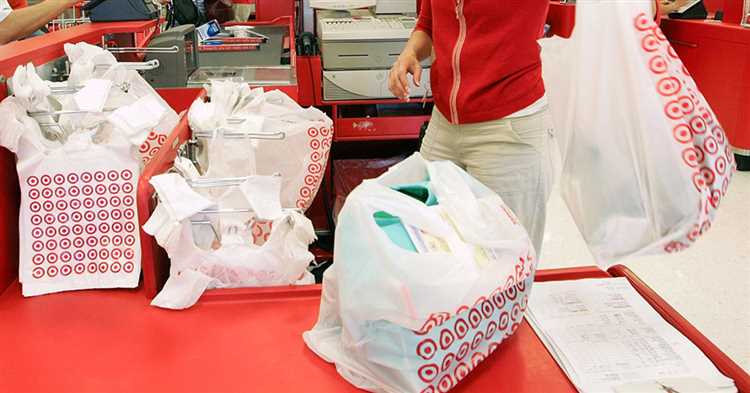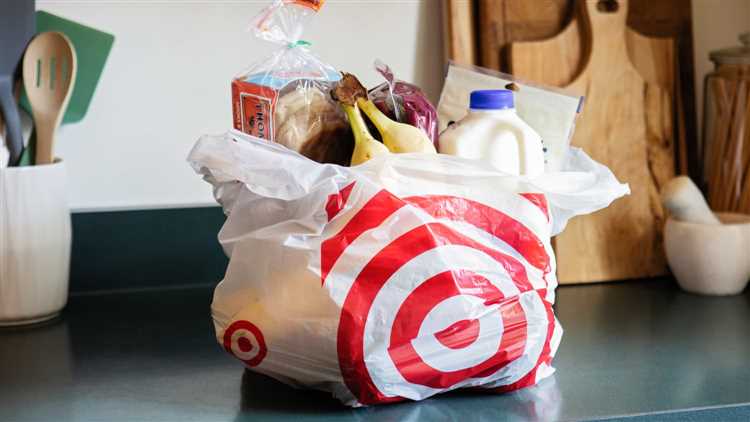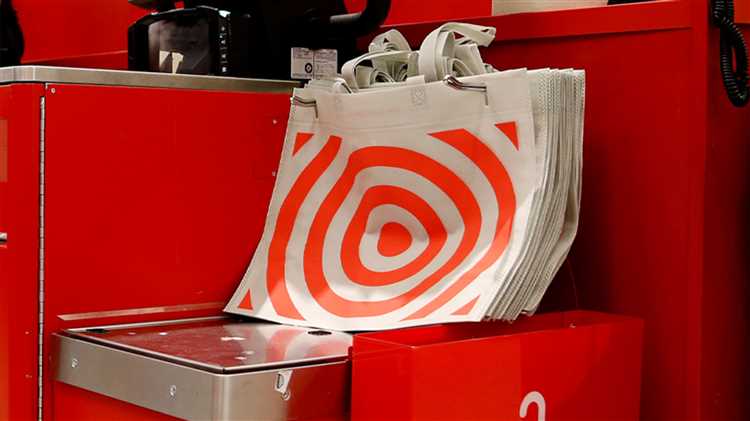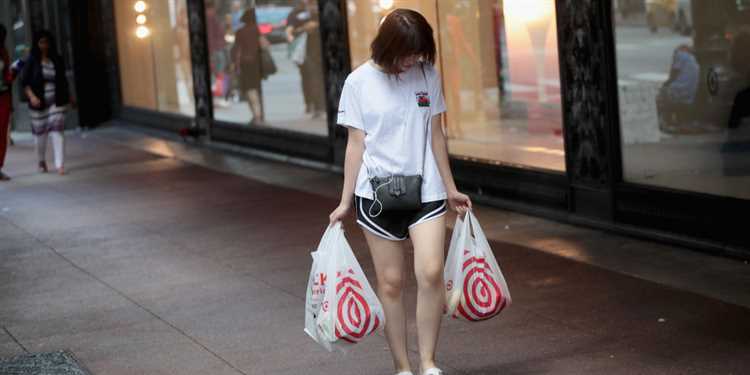In recent years, there has been a growing global effort to reduce plastic waste and promote sustainability. As a result, many businesses and retailers have started implementing changes to their operations to align with these eco-friendly initiatives. Target, one of the largest retail chains in the United States, has also taken steps towards reducing plastic waste.
Previously, Target provided plastic bags to customers for their purchases, but the company has made significant changes to its bagging practices. In an effort to promote sustainability and minimize its environmental impact, Target has phased out the use of plastic bags in many of its stores.
Instead of plastic bags, Target now offers reusable bags made from recycled materials. These bags are not only sturdier and more durable than plastic bags, but they also help reduce waste and encourage customers to adopt a more eco-conscious lifestyle. Additionally, Target incentivizes customers to bring their own bags by offering a small discount for doing so.
While the transition away from plastic bags may take some getting used to for customers, it is a positive step towards a greener future. By eliminating plastic bags from their stores, Target is contributing to the reduction of plastic waste and encouraging shoppers to make more sustainable choices. So next time you visit Target, don’t forget to bring your reusable bags!
- Does Target Still Offer Plastic Bags?
- Benefits of the Plastic Bag Phase-Out
- How Target Encourages Sustainable Shopping
- History of Plastic Bags
- Environmental Impact of Plastic Bags
- Shift Towards Sustainable Packaging
- Target’s Commitment to Sustainability
- Question-Answer:
- Does Target still offer plastic bags?
- Why is Target still offering plastic bags?
- What steps is Target taking to reduce the use of plastic bags?
- Are there any Target stores that have completely eliminated plastic bags?
Does Target Still Offer Plastic Bags?

Target, one of the largest retail chains in the United States, has taken significant steps in recent years to reduce its environmental impact. As part of their commitment to sustainability, Target decided to phase out the use of single-use plastic bags in their stores.
This change was implemented as part of Target’s effort to promote reusable bags and encourage customers to make more sustainable choices. By eliminating plastic bags from their stores, Target aims to reduce the amount of plastic waste that ends up in landfills and natural environments.
Instead of offering plastic bags, Target now encourages customers to bring their own reusable bags or provide them with alternative options. They offer a wide selection of reusable bags at affordable prices, ranging from simple cotton totes to fashionable and durable options.
Benefits of the Plastic Bag Phase-Out

By phasing out plastic bags, Target has made a positive impact on the environment. Plastic bags can take hundreds of years to decompose, and they often end up in the ocean, causing harm to marine life. By encouraging the use of reusable bags, Target is helping to reduce the amount of plastic waste that pollutes our planet.
Additionally, the elimination of plastic bags has helped Target save on production and disposal costs. By not providing single-use bags, they can allocate their resources to more sustainable practices and investments.
How Target Encourages Sustainable Shopping
Target has made sustainability an integral part of their business strategy. In addition to phasing out plastic bags, they have introduced various initiatives to promote environmental responsibility. Target offers recycling programs for plastic bags and other materials in their stores, and they are working to reduce greenhouse gas emissions from their operations.
Furthermore, Target has partnered with suppliers to develop more sustainable packaging solutions. They are also committed to increasing the use of renewable energy to power their stores and distribution centers.
In conclusion, Target no longer offers plastic bags in their stores, as part of their commitment to sustainability. They encourage customers to bring their own reusable bags or offer alternative options. By eliminating plastic bags, Target aims to reduce plastic waste and promote more sustainable choices.
History of Plastic Bags

Plastic bags were first introduced in the 1950s as an alternative to paper bags. Their popularity grew rapidly due to their durability, lightweight nature, and affordability. Initially, plastic bags were made from low-density polyethylene (LDPE), which is a type of plastic that is flexible and easily molded. The manufacturing process involved heating and shaping the plastic into bags of various sizes and thicknesses.
In the following decades, plastic bags became increasingly prevalent in retail stores due to their convenience and cost-effectiveness. They provided a convenient way for customers to carry their purchases, and retailers benefited from the lower production and transportation costs compared to paper bags.
However, concerns about the environmental impact of plastic bags started to emerge in the 1990s. The non-biodegradable nature of plastic and its potential to harm wildlife and pollute ecosystems became significant issues. As a result, various initiatives, such as recycling programs and bag bans, were implemented by governments and organizations worldwide to reduce plastic bag usage and encourage the use of more sustainable alternatives.
In recent years, many retailers, including Target, have made efforts to reduce their reliance on plastic bags. Target introduced reusable bags and encouraged customers to bring their own bags by offering incentives and discounts. Despite these changes, some Target stores may still offer plastic bags, although the availability may vary depending on local regulations and store policies.
As society becomes more environmentally conscious, the future of plastic bags remains uncertain. It is likely that their usage will continue to decline as more sustainable alternatives, such as reusable bags and biodegradable materials, become more widely available and accepted.
Environmental Impact of Plastic Bags

Plastic bags have a significant environmental impact that cannot be ignored. Here are some of the key issues associated with their use:
- Resource Depletion: Plastic bags are made from non-renewable resources such as oil and gas. Their production contributes to the depletion of these valuable resources.
- Greenhouse Gas Emissions: The manufacturing process of plastic bags releases greenhouse gases into the atmosphere. These gases contribute to climate change and global warming.
- Litter and Pollution: Plastic bags are frequently discarded improperly, ending up in landfills, water bodies, and natural environments. They can take hundreds of years to decompose, causing pollution and harm to wildlife.
- Plastic Waste: The disposal of plastic bags is a major problem worldwide. These bags are difficult to recycle, and many end up in incinerators or are dumped in developing countries, leading to further environmental degradation.
- Marine Life Threat: Plastic bags pose a significant threat to marine life. Animals such as turtles, whales, and seabirds can mistake them for food, resulting in ingestion and entanglement, leading to injury or death.
- Microplastic Pollution: Over time, plastic bags break down into smaller and smaller pieces called microplastics. These microplastics can enter the food chain, potentially causing health problems for both animals and humans.
Considering these environmental impacts, it is crucial to reduce the use of plastic bags and explore more sustainable alternatives.
Shift Towards Sustainable Packaging
With growing concerns about the environmental impact of single-use plastic bags, many retailers, including Target, are making a conscious shift towards sustainable packaging solutions.
Target recognizes the importance of reducing its plastic waste and is actively exploring alternatives to traditional plastic bags. The company has started offering customers reusable bags made from recycled materials, encouraging shoppers to bring their own bags and reduce their carbon footprint.
In addition to reusable bags, Target has also introduced paper bags as an alternative option for customers. These bags are made from recycled materials and are recyclable themselves, further reducing the impact on the environment.
Furthermore, Target is working closely with its suppliers to find innovative packaging solutions that are both environmentally friendly and functional. The company is investing in research and development to find alternatives to plastic packaging, such as biodegradable options or materials made from renewable resources.
Target’s shift towards sustainable packaging aligns with the growing consumer demand for eco-friendly practices. By reducing its reliance on single-use plastic bags and exploring alternative packaging options, Target is taking significant steps towards minimizing its environmental footprint and contributing to a more sustainable future.
As consumers, we also play a crucial role in this shift towards sustainable packaging. By choosing to use reusable bags, recycling paper bags, and supporting companies that prioritize eco-friendly practices, we can collectively make a positive impact on the environment and work towards a greener future.
Target’s Commitment to Sustainability

As a company, Target is deeply committed to sustainability and reducing its environmental impact. Target understands the importance of taking action to protect our planet and future generations.
One way Target demonstrates its commitment to sustainability is by promoting the use of reusable bags. Target encourages customers to bring their own reusable bags by offering a discount on their purchase for each bag used. By reducing the reliance on single-use plastic bags, Target is helping to minimize waste and decrease the amount of plastic in our landfills and oceans.
In addition to promoting reusable bags, Target has also implemented other sustainable practices throughout its operations. The company is constantly seeking ways to improve energy efficiency in its stores, reducing greenhouse gas emissions and conserving natural resources. Target also works with suppliers to ensure that products are sourced responsibly and to increase the use of sustainable materials.
Target’s commitment to sustainability extends beyond its own operations. The company actively engages in community initiatives and partnerships aimed at promoting environmental stewardship. It invests in renewable energy projects, supports recycling programs, and educates the public on the importance of sustainable living.
Overall, Target is dedicated to making a positive impact on the environment. Through its commitment to sustainability, the company is working towards a greener future and inspiring others to do the same.
Question-Answer:
Does Target still offer plastic bags?
Yes, Target still offers plastic bags for customers at checkout. However, they are taking steps to reduce their use of single-use plastic bags and encourage customers to bring their own reusable bags.
Why is Target still offering plastic bags?
Target still offers plastic bags because they understand that many customers still prefer the convenience of using plastic bags at checkout. However, they are actively working to reduce their use of plastic bags and promote the use of reusable bags.
What steps is Target taking to reduce the use of plastic bags?
Target is taking several steps to reduce the use of plastic bags. They are offering a five-cent discount for each reusable shopping bag that customers bring, and they have also introduced a line of affordable reusable bags for sale. Additionally, Target is exploring sustainable alternatives to plastic bags, such as compostable bags made from plant-based materials.
Are there any Target stores that have completely eliminated plastic bags?
As of now, there are no Target stores that have completely eliminated plastic bags. However, some Target locations have implemented pilot programs where they have removed plastic bags from checkout and only offer reusable bags or paper bags. Target is using these pilot programs to gather feedback and evaluate the feasibility of eliminating plastic bags in the future.